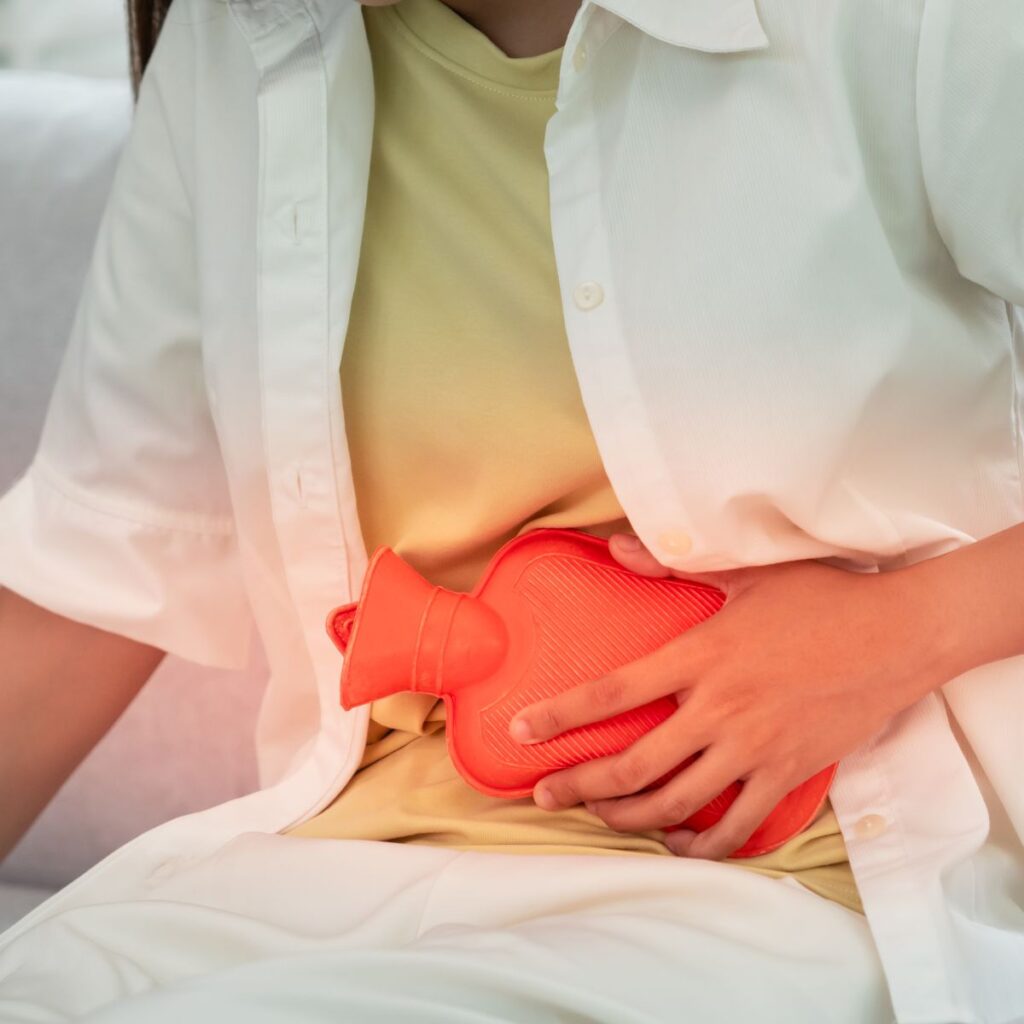Blog
First Aid for Inflamed Intestines
When the intestines become inflamed—whether due to irritable bowel syndrome (IBS), chronic inflammation such as Crohn’s or ulcerative colitis (IBD), or small intestinal bacterial overgrowth (SIBO)—the patient feels as though their digestive system is highly irritated.
But there are practical steps that can make a difference within a few days and prepare the intestines for complete healing.
What causes flare-ups (flares)?
A flare begins when the intestinal lining loses its delicate balance, and inflammation increases due to:
- Eating irritating foods such as gluten, dairy products, fried foods, caffeine, and alcohol.
- Psychological stress, which increases symptom severity by up to 60%.
- Bacterial infection or overgrowth of harmful bacteria (SIBO).
- Lack of sleep or excessive exercise.
Acute Flare Symptoms

- Internal heat or a feeling of warmth.
- Abdominal cramps and pain.
- Diarrhea and mucus in stool.
- Bloating and gas.
- General fatigue and poor appetite.
Two-Week Diet to Relieve Inflamed Intestines
During an acute flare, the intestines need rest and simple digestion.
The golden rule: Light, easily digestible food, therapeutic drinks, and soothing supplements. The goal is to calm inflammation and give the intestines complete rest.
Therapeutic Foods to Focus On During These Two Weeks

Choose well-cooked, easily digestible meals that don’t burden the digestive system:
- Baked or mashed potatoes.
- Cooked apples without peel.
- Pumpkin, carrot, or roasted zucchini soup.
- Smoothies with easily digestible plant protein such as organic sprouted brown rice protein.
- Well-boiled eggs or lightly grilled chicken (only in calmer phases).
Completely avoid foods that ferment in the gut or are hard to digest during these two weeks, such as raw vegetables and seeds, legumes, fried foods, gluten, and dairy products.
Therapeutic Drinks
During a flare, healing fluids act as “first aid” for the intestines:
- Bone Broth
One of the most important elements that helps repair the intestinal lining, as it contains collagen, glycine, and glutamine.
Drink two cups daily, morning and evening. - Green Juice
One cup on an empty stomach daily, prepared from cucumber, spirulina, and cooked spinach.
Helps calm inflammation and nourish cells without burdening the intestines with hard-to-digest fibers. - Carrot or Beet Juice
Rich in antioxidants and improves bowel movement.
Preferably taken two to three times a week, or half a cup daily. - Soothing Teas

- Chamomile tea: a natural anti-inflammatory.
- Peppermint or ginger tea: relieves gas and cramps.
- Licorice and marshmallow root tea: protects the intestinal lining and soothes pain.
Therapeutic Supplements
These supplements aim to support digestion and repair the intestinal lining—not to overstimulate it.
- Natural Digestive Enzymes
Take one capsule before each meal to support digestion and reduce gas and malabsorption. - L-Glutamine
One scoop daily with juice or smoothie—helps repair the intestinal wall and improve absorption.
- Collagen (Grass-Fed Bovine)
One scoop daily with any warm drink or green juice to support tissue repair. - 100% Natural Aloe Vera Juice
¼ cup daily to soothe the intestinal lining and reduce inflammation. - Natural Antimicrobials
At the end of the first week, you can introduce:
- Oregano oil (5 drops in a cup of water), or
- Olive leaf extract, to gently cleanse the intestines from bacteria that cause fermentation and gas.
With adherence to this protocol for two weeks, inflammation will gradually subside, absorption will begin to improve, and stool consistency will return to normal.
At that point, the intestines will have rested enough to begin reintroducing fiber gradually and probiotics—the most important step in true healing.
Key Foods to Reintroduce Gradually After Two Weeks
After two weeks, start introducing supportive nutrients and supplements that help rebuild the intestinal lining and restore balance to the microbiome (beneficial bacteria).
The goal here is to nourish the cells, repair tissues, and enhance digestive immunity so the intestines become more resilient and stable.
1.Gradually Introduce Soluble Fiber
After inflammation subsides, you can introduce small, gradual amounts of soluble fiber, as it plays a vital role in feeding beneficial bacteria and improving bowel movement.
Best options: cooked oats, soaked chia seeds, green bananas, Arabic gum, and well-cooked broccoli.
Start with a small daily amount and increase gradually according to digestive tolerance.
2. Probiotics (Beneficial Bacteria)
Probiotics are the cornerstone of restoring a healthy gut environment.
Choose a probiotic supplement with multiple strains (8 or more), especially Bacillus strains if you suffer from harmful bacterial overgrowth (SIBO).
If probiotics initially cause bloating or discomfort, postpone their use until the third week while continuing gut support with soothing and cleansing foods.
3. Rebuilding the Microbiome
This step is vital for healing, as it helps establish bacterial balance that prevents the return of inflammation.
 Be sure to consume prebiotic-rich foods such as green bananas, oats, cooked onions, and pomegranate seeds, along with naturally fermented foods like kefir, kimchi, miso, and kombucha.
Be sure to consume prebiotic-rich foods such as green bananas, oats, cooked onions, and pomegranate seeds, along with naturally fermented foods like kefir, kimchi, miso, and kombucha.
These nourish good bacteria and rebuild the gut ecosystem comprehensively.
4. Supporting Mental and Nervous Health
Gut health cannot be separated from mental state—stress and anxiety increase inflammation and weaken digestive immunity.
Therefore, ensure adequate sleep (7–9 hours) and practice meditation or deep breathing daily.
You may also use calming herbs such as ashwagandha or reishi mushrooms to balance cortisol and strengthen stress resistance.
Conclusion
By following these steps gradually and mindfully, the intestines begin to regain their natural balance, digestion and absorption improve, and inflammation and cramps subside gradually.
Over time, you’ll feel your energy returning, your appetite stabilizing, and your digestive system calmer and more comfortable.
Commitment to this holistic approach—nutritionally, supplementally, and mentally—is the true key to deep healing and restoring long-term intestinal health.

